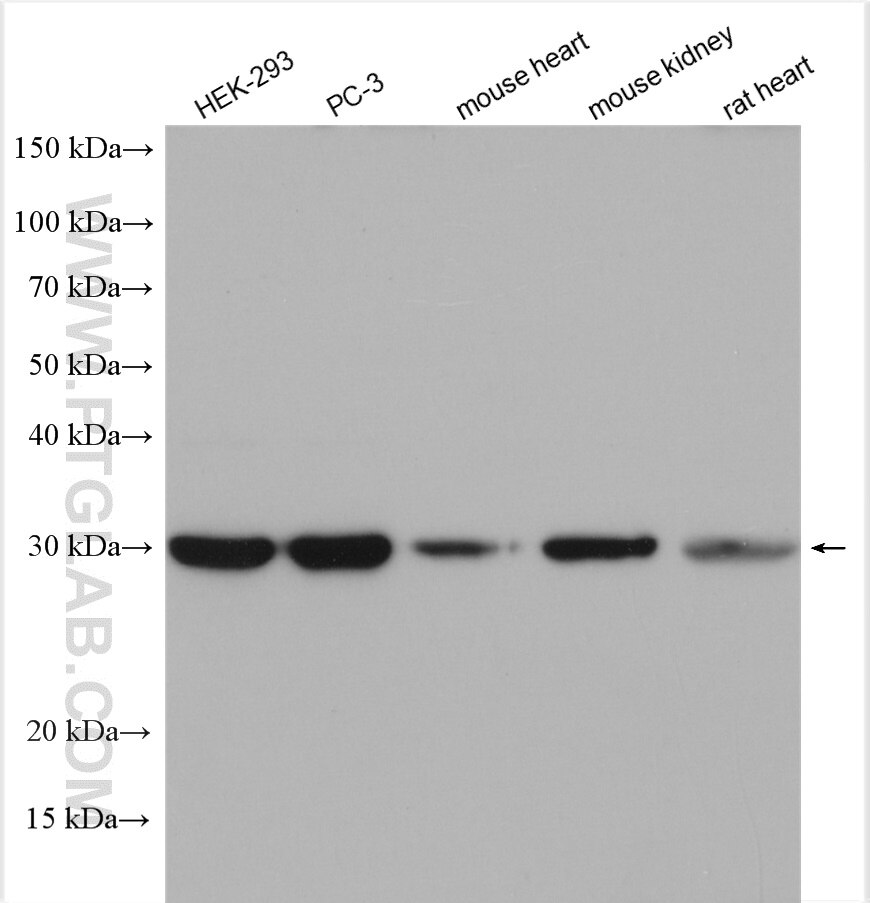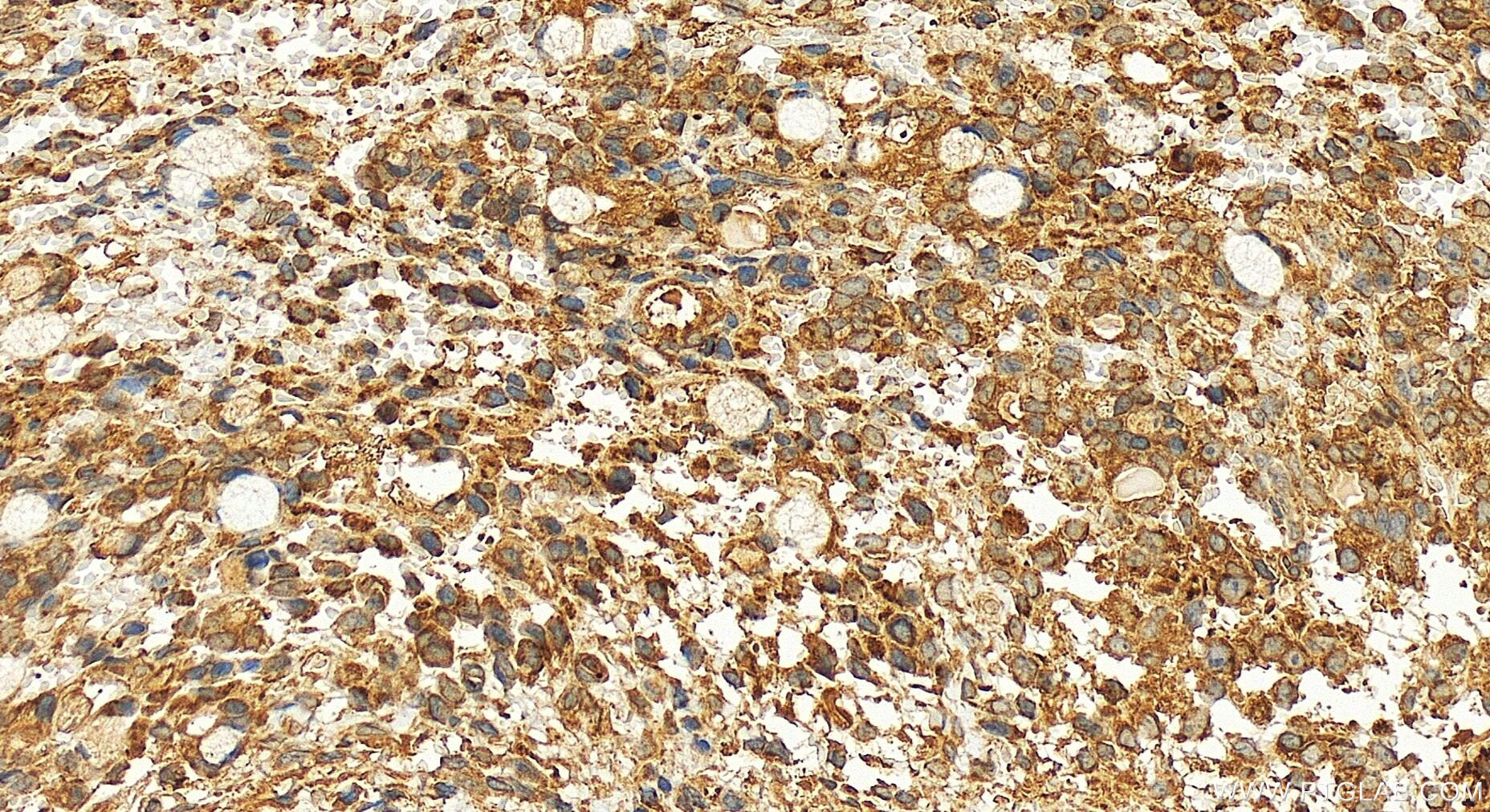ATPAF1 Polyklonaler Antikörper
ATPAF1 Polyklonal Antikörper für WB, IHC, ELISA
Wirt / Isotyp
Kaninchen / IgG
Getestete Reaktivität
human, Maus, Ratte
Anwendung
WB, IHC, ELISA
Konjugation
Unkonjugiert
Kat-Nr. : 18016-1-AP
Synonyme
Geprüfte Anwendungen
| Erfolgreiche Detektion in WB | HEK-293-Zellen, Mausherzgewebe, Mausnierengewebe, PC-3-Zellen, Rattenherzgewebe |
| Erfolgreiche Detektion in IHC | human ovary cancer tissue Hinweis: Antigendemaskierung mit TE-Puffer pH 9,0 empfohlen. (*) Wahlweise kann die Antigendemaskierung auch mit Citratpuffer pH 6,0 erfolgen. |
Empfohlene Verdünnung
| Anwendung | Verdünnung |
|---|---|
| Western Blot (WB) | WB : 1:500-1:4000 |
| Immunhistochemie (IHC) | IHC : 1:50-1:500 |
| It is recommended that this reagent should be titrated in each testing system to obtain optimal results. | |
| Sample-dependent, check data in validation data gallery | |
Veröffentlichte Anwendungen
| WB | See 4 publications below |
Produktinformation
18016-1-AP bindet in WB, IHC, ELISA ATPAF1 und zeigt Reaktivität mit human, Maus, Ratten
| Getestete Reaktivität | human, Maus, Ratte |
| In Publikationen genannte Reaktivität | human, Maus |
| Wirt / Isotyp | Kaninchen / IgG |
| Klonalität | Polyklonal |
| Typ | Antikörper |
| Immunogen | ATPAF1 fusion protein Ag12557 |
| Vollständiger Name | ATP synthase mitochondrial F1 complex assembly factor 1 |
| Berechnetes Molekulargewicht | 328 aa, 36 kDa |
| Beobachtetes Molekulargewicht | 31 kDa |
| GenBank-Zugangsnummer | BC071731 |
| Gene symbol | ATPAF1 |
| Gene ID (NCBI) | 64756 |
| Konjugation | Unkonjugiert |
| Form | Liquid |
| Reinigungsmethode | Antigen-Affinitätsreinigung |
| Lagerungspuffer | PBS with 0.02% sodium azide and 50% glycerol |
| Lagerungsbedingungen | Bei -20°C lagern. Nach dem Versand ein Jahr lang stabil Aliquotieren ist bei -20oC Lagerung nicht notwendig. 20ul Größen enthalten 0,1% BSA. |
Protokolle
| PRODUKTSPEZIFISCHE PROTOKOLLE | |
|---|---|
| WB protocol for ATPAF1 antibody 18016-1-AP | Protokoll herunterladen |
| IHC protocol for ATPAF1 antibody 18016-1-AP | Protokoll herunterladenl |
| STANDARD-PROTOKOLLE | |
|---|---|
| Klicken Sie hier, um unsere Standardprotokolle anzuzeigen |
Publikationen
| Species | Application | Title |
|---|---|---|
Int J Mol Sci CA9 Silencing Promotes Mitochondrial Biogenesis, Increases Putrescine Toxicity and Decreases Cell Motility to Suppress ccRCC Progression. | ||
Am J Physiol Endocrinol Metab Exogenous H2S reduces acetylation levels of mitochondrial respiratory enzymes via regulating NAD+-SIRT3 pathway in cardiac tissues of db/db mice. | ||
Metabolism FAM3A maintains metabolic homeostasis by interacting with F1-ATP synthase to regulate the activity and assembly of ATP synthase | ||
iScience Deficient tRNA posttranscription modification dysregulated the mitochondrial quality controls and apoptosis |



